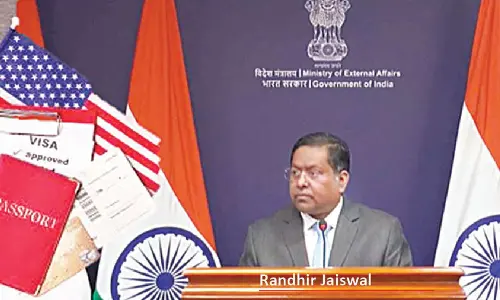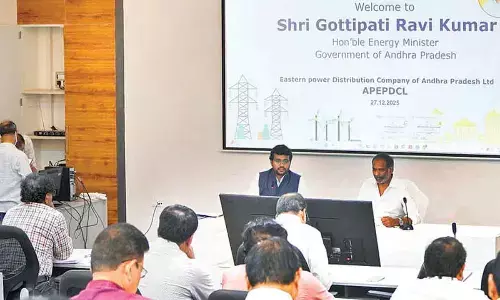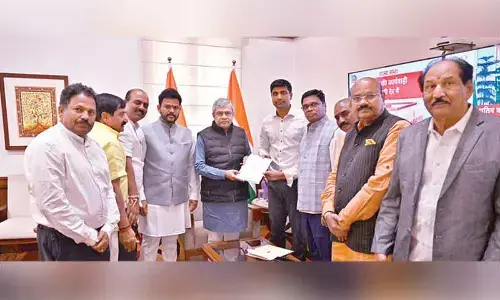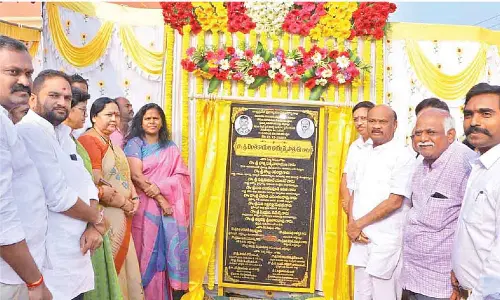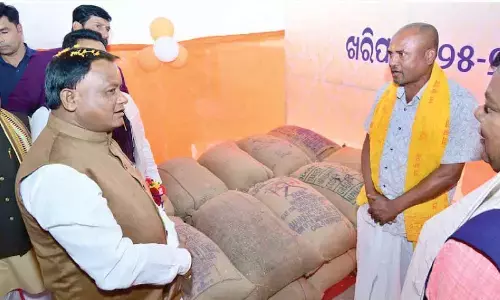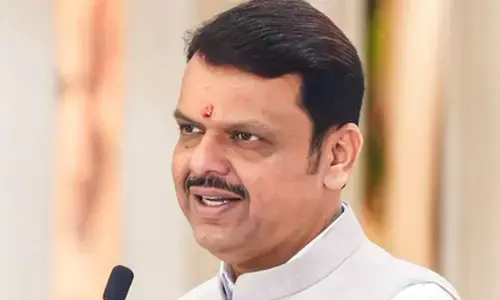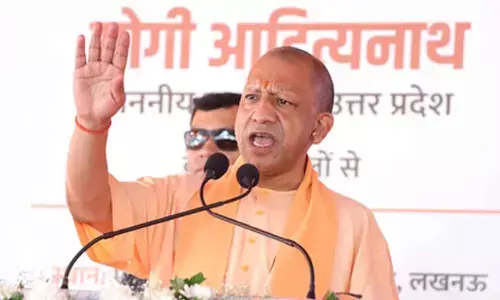mystery of The missing tape

That the All India Radio is privy to many rare recordings is a common knowledge. That AIR had recorded three speeches of Mohammed Ali Jinnah just before Pakistan was born, was not so much in public knowledge until recently. On September 3 this year, audio files of two of the speeches were sent across the border by email. The third one is yet to be traced. What the missing tape contains continues to be an unresolved mystery
S Madhusudhana Rao
Ever since the partition of India at the midnight of August 15,1947, All India Radio has been holding some of the dark secrets of that time in its vaults in New Delhi. The state radio’s archives are a depository of rarest collection of speeches of Indian Independence heroes, music maestros and many others from various walks of life.
Tucked somewhere in the labyrinth were three tapes containing the speeches Mohammed Ali Jinnah had delivered just before Pakistan was born. What did he say and what message he had delivered to his new-born country and its people had remained relatively unknown for a majority of the sub-continent’s people since the original recordings had been ‘lost.’ Researchers had to depend on a few newspaper clippings which were not verbatim in content, raising doubts about their authenticity and fuelling speculation about Jinnah’s vision of a ‘secular Pakistan.’
.jpg)
Off and on, both in India and Pakistan, fundamentalists and pseudo-secularists rake up the issue whether the Founder of Pakistan was secular to the core and if he were why did he found an Islamic State for Muslims living in pre-partition India? Pakistan is the first country in the world to be cloven to establish Muslim identity from majority Hindu India. In this country, an accusing finger is pointed at British-educated Jinnah for the creation of Pakistan whereas he is revered as the Founding Father in that country, a status Mahatma Gandhi commands in India.
While Gandhi was quintessentially secular, Jinnah is demonised here and held responsible for partition. Pakistani history books project him as champion of Indian Muslims in the pre-partition days and describe him as the saviour of millions who had migrated to the ‘Land of the Pure’ post-1947.
As always, history gets twisted and facts and fiction get inexorably mixed up in a world that looks at the past not with an open mind but with blinkered eyes. Jinnah, as a leader of Muslim League during the independence struggle and later as a crusader of Muslims before the British partitioned India, might have been a victim of historical distortions that followed the 1947 events. The clues to his vision and hopes of Hindu-Muslim brotherhood in two countries existing side by side he might have expressed in two of his three speeches before India was divided.
The three speeches in question were made on June 3, August 11 and August 14 respectively. Now, only two are known while the third one is ‘not yet traceable.’ The search for them was a joint Indo-Pak initiative, with goading from our neighbouring government in general and former Pakistan Broadcasting Corporation (PBC) Director General Murtaza Solangi, in particular.

Solangi, when he was PBC boss, had first contacted the BBC to get copies of the transcription disc but to his utter disappointment, the corporation said it had none in its vast archives. He then turned his attention to AIR which, many suspected, might have archived the tapes since one speech delivered on June 3 was recorded in Delhi and the remaining two – given on August 11 and August 14, 1947 -- were recorded in Karachi.
The one delivered at AIR Delhi on June 3, 1947, was Jinnah’s reaction to a proposal on holding a referendum in the North West Frontier Province whether it would like to join India or Pakistan and the other two pertained to his address to the Pakistan Constituent Assembly on August 11 and three days later when Pakistan became a sovereign country.
That the historic speech of the Founder of Pakistan was recorded by All India Radio was gratifying, the fact was since no proper recording facilities were available in the just-born country, officials there had requested AIR to dispatch a team to record the history that was in the making. Thanks to India’s graciousness, AIR had readily obliged. While Jinnah’s path-breaking speech to his countrymen at the first Constituent Assembly held in Karachi (capital at that time), is known to many people, what is not known is his address to the Assembly three days earlier. The August 14 speech is generally touted as Jinnah’s Tryst with Destiny like Nehru’s on India’s Independence.
But more relevant to the new country is believed to be the August 11 speech in which Jinnah was supposed to have put forth his vision of Pakistan. Truly, it is a missing link between June 3 and August 14 developments that changed the course of history in many ways.
First, the North West Frontier Province had decided to stay put with Pakistan. Second, Jinnah’s vision of his country was not to be a theocratic state. But the reality now is vastly different. In six and a half decades, the socio-political complexion of Pakistan has changed so much that Jinnah’s August 11, 1947 sermon had lost its bearing on the people, particularly with the process of Islamisation and fundamentalists wielding power and influence while moderates and liberals look on helplessly.

However, they still believe had the country followed Jinnah’s policy Pakistan would not have been in such dire straits as it is today. At the heart of their belief is Jinnah’s ‘missing speech’ in which he is said to have spoken in the clearest possible terms of his dream that the country he was creating would be tolerant, inclusive and secular.
According to the BBC, he said in that speech: "You are free. You are free to go to your temples, you are free to go to your mosques or to any other place of worship in this state of Pakistan. You may belong to any religion or caste or creed -- that has nothing to do with the business of the state." His statement can be interpreted as the one similar to India’s secular policy. However, there are different interpretations that were drawn from various sources, some arguing Jinnah wanted a Muslim-majority but secular and progressive country. Neither view has ever been discussed publicly since Pakistan was created.
The reasons are not far to seek: From the very beginning, Pakistanis have been made to believe that the country’s raison d'être is to stand for Muslims and that is the whole purpose of creating the Land of the Pure by Jinnah. Had the country not suffered in the hands of military generals, probably, Pakistanis would have given a thought to what their Founding Father had propounded. But, the successive military regimes had given a short shrift to Jinnah and his vision to perpetuate their stranglehold on the country and its people in such a way as to suppress any liberal-secular thought.
Documented evidence suggests, according to the BBC, that Jinnah's words didn't go down well with the powerful and ambitious religious ideologues around him at the time, who then made sure the speech was virtually blacked out in the next day's newspapers. Successive military governments in Pakistan were accused of attempting to downplay, even remove, the speech from official records.
Distortions and excisions of Jinnah’s crucial speech are believed to have been done by Pakistani leaders to safeguard their own interests and protect power bases by playing the Islamic card. Events in the last few decades are ample proof that an anti-India policy is the key to survival of some military and political leaders and any attempt to endorse Jinnah’s views will be detrimental to their interests. As the BBC rightly puts it, “Jinnah was repackaged as an Islamic leader, rather than a westernised secular man he had been for much of his life. Jinnah's ideals for Pakistan were further muddled, as the country's hardliners began to question whether the founding father had indeed said those words in his address, was he in the right frame of mind or what he might have meant by them.”
Radio Pakistan’s ex-official Solangi, however, suspects that if ever Pakistan possessed the August 11 recording it might have been destroyed long ago. Determined to find the real contents of Jinnah’s August 11 speech, he approached AIR.
Solangi, attending an Asia-Pacific Broadcasting Union conference in Delhi, in November 2011, broached the issue with the head of the International Department of All India Radio whether they had Jinnah’s speeches he had delivered before partition. The official’s positive response had enthused Solangi who started pulling strings at various levels both in India and Pakistan to get the copies of the speeches. His efforts fructified when Solangi sought AIR Director General’s help in retrieving the recordings of Jinnah’s speeches. Credit should also go to right to information activist Subhash Chandra Agrawal who helped get the tapes out and to Pakistan through official channels.
On September 3 this year, two audio files were sent across the border by email. Confirming their receipt Javed Khan Jadoon, head of Current Affairs at Pakistan Radio, is quoted by Dawn as saying that they were stored in archives and a decision to air the speeches will be taken soon. “It could be done on a commemorative occasion and Jinnah’s death anniversary was coming up on September 11,” he said. Apparently, no decision has been taken.
But Solangi was a disappointed man. After all his efforts, what he got was June 9 and August 14 tapes, not the August 11th though Indian officials had confirmed its existence. "They [AIR officials] initially told me they have the missing August 11th tape, but of late have become evasive about it," Solangi told the BBC recently. "They have told others they don't have it. At the moment, we just don't know whether they have it or not."
AIR’s diabolical stand is puzzling for two reasons: If it has, why is it not disclosing; if it does not, why not say so. If the tape is traced and its contents are made public, they are not going to change the course of Pakistan. By choosing to be non-committal, AIR has only helped deepen the mystery.








